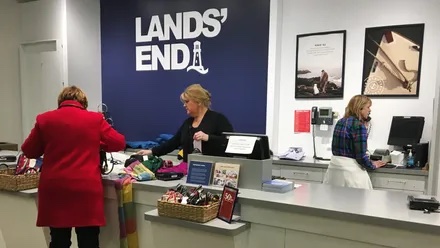
Neil A. Carousso produces NewsNation original “Kurt’s Country” – a celebration of country music and a slice of Americana with host Kurt Bardella.
-
The secret staying power of Lands’ End: A Decision Makers exclusive
Posted by: Neil A. CaroussoPost Views: 673Executive Produced by Neil A. Carousso
“Don’t get stuck in your ways,” might seem like unexpected advice coming from Lands’ End CEO Jerome Griffith.
Why? Well, the company is heading towards its 60th anniversary and, as Bloomberg’s Carol Massar noted during a recent Decision Makers interview with Griffith she hosted alongside WBBM Newsradio’s Cisco Cotto, Lands’ End has been called “stodgy” in the past.
Decision Makers interviews offer a peek inside some of the most well-known consumer brands in the country and the executives, such as Griffith, who run them.
Massar noted that the “stodgy” comment came before Griffith, formerly of Esprit, Tommy Hilfiger and Tumi, took the helm of Lands’ End in 2017.
While the company – which has evolved from a yacht supply store in Chicago to an apparel and home goods company in the past half century – is still known for dependable, comfortable apparel under his leadership, Griffith explained how it has to change things up in order to keep appealing to customers.“You have to stay flexible,” he said. For Lands’ End, this focus on flexibility extends from its manufacturing decisions and its corporate culture to its product distribution and marketing.
Griffith explained that the company has worked for years to make sure its products aren’t all made in the same place.
“We didn’t want to be tied into any one country,” he said, adding that no one country represents more than 20% of manufacturing for the Lands’ End. This approach has helped the company avoid some of the potential impact of COVID-19 pandemic-related shutdowns, including a recent two-month shutdown in Vietnam.
Since the pandemic began two years ago, Griffith said Lands’ End has also embraced the benefits of remote work. Designers have been able to work using 3D technology. Customers have been consistently satisfied with the fit of clothes made by the company according to the TruFit app and Lands’ End has managed to keep up low return rates for its products, said the CEO.
Remote work has helped current employees become more efficient and it has also helped the Dodgeville, Wisc., company expand its talent base, said Griffith. Recently, workers have started coming back to the office for “collaboration sessions,” but the CEO doesn’t think working there will ever be the same.
“What you’re really seeing is a wholesale change of how people work,” he said.
As the company becomes more flexible about remote work, it has also been carving out a new distribution strategy. In addition to its own stores and website, Lands’ End offers its products online through Amazon, online and in-store through Kohl’s and is working with QVC for TV shopping.
Griffith said that offering Lands’ End at brick-and-mortar Kohl’s stores has only increased online sales for the company. Products are expected to be available at more than 500 Kohl’s locations by the end of the year.
“You’re relevant because you’re there,” he said.
Another collaboration aimed at keeping the brand relevant was with Draper James, Reese Witherspoon’s clothing line.
“It makes it cool, and the cool factor is something you can’t…really put your finger on,” Griffith said.
However, the most important part of staying relevant is understanding your customer, he said. And Griffith really knows the Lands’ End customer.
She’s a woman in her 40s or 50s living in suburbia. She’s affluent but frugal, she works and she is tech savvy, doing most of her shopping from her smartphone. Her children probably still live at home and she picks out her husband’s clothes for him – at Lands’ End.
Griffith said most of the men’s apparel produced by the company is actually purchased by women. School uniforms are another big seller.
The typical Lands’ End customer is also loyal and shops with the company for an average of 17 years, he said.
In recent years, the company has also worked to include more diversity in its marketing. Just before the pandemic, in 2019, Lands’ End launched “Let’s Get Comfy,” a campaign based on its customers’ biggest priority: comfort.
It proved to be a prophetic campaign when the pandemic forced people at home and reduced a need for more formal office attire.“Better to be lucky than smart,” said Griffith of the campaign.
Going forward, he said the company still faces challenges such as supply chain issues and inflation. Even so, he thinks the future looks bright for Lands’ End.
“If you look at 2021, it was really a great year for the company. Overall, we had a good increase in revenue to the point where it’s our best year since 2011,” he said. “It’s our best earning year since 2014, when we were spun off from Sears as a public company. So, we feel really good about where the year ended up.”
Griffith said the company is looking to hire more employees, to expand its distribution and to grow its uniform business. He also said they are always keeping an eye on customer data as more Gen X customers join Baby Boomers as loyal Lands’ End shoppers.
Towels and sheets made by Lands’ End might even be the key to reaching out to millennials, he told Massar and Cotto. His children, at least, have been big fans and are spreading the word to their friends.
At the end of the day, Griffith said that keeping both Lands’ End customers and team members happy is the key to success, especially through difficult times such as a pandemic.
“I think the most important thing we should really be doing is keeping our people motivated,” he said.
Decision Makers is a joint exclusive production from Bloomberg and Audacy and executive produced by Neil A. Carousso.
-
After more than 50 years in Queens, COVID could force master stylist into retirement
Posted by: Neil A. CaroussoPost Views: 552By Joe Connolly and Neil A. Carousso
NEW YORK (WCBS 880) — COVID-19 has had a devastating impact on salons and barbershops. It’s an indication that other parts of the economy are struggling to fully recover from the pandemic.
“The business is down by 50 percent,” said long-time Queens master stylist Michael Alick on the WCBS Small Business Spotlight, sponsored by Dime Community Bank.
Alick learned the craft from his father and began working as a master stylist in Manhattan in the 1970s. About 10 years later, he opened his own salon on Bell Boulevard in Bayside where he’s worked ever since.
“I’m going to be fully retired after I worked 50 years in the industry,” he lamented. “So, I’ve seen the good days and I’ve seen bad days, but COVID is the worst.”
Alick told WCBS 880 that people are not getting haircuts and coloring their hair professionally like they used to, because they’re working remotely and dressing more casually even when they are in the office.
“Nobody’s spending money, if they make the money, like they used to, such as like luxury, going out, go to the hairdresser, look good, dress up,” he said.
The master stylist recently took up a chair twice a week at a salon in Greenwich, CT where he sees more young professionals than Bayside.

Michael Alick recently took up a chair twice a week at a salon in Greenwich, CT. Photo credit Facebook/Michael’s Place Salon But, he keeps a chair at an Asian-owned salon in Bayside out of loyalty to the clients that have stayed with him through the pandemic.
“I have loyal clients from 10 to 30 years. They were loyal to me, so I work in Bayside two days just to take care of them,” said Alick.
He credits his longevity in the industry to personal relationships.
See more on this story on the WCBS Small Business Spotlight video above.
-
Small Business Comeback Tour: The Scout Guide Bergen County
Posted by: Neil A. CaroussoPost Views: 590By Joe Connolly and Neil A. Carousso
BERGEN COUNTY, NJ (WCBS 880) — This hyper-local community news resource goes the extra mile to support small businesses.
“We’re Bergen County girls,” said Chris Doherty who joined her co-editor Eileen Sweeney on the WCBS Small Business Comeback Tour, sponsored by PSE&G.
Together, Doherty and Sweeney curate and share positive stories of local businesses across Bergen County, which is one of 65 current markets in The Scout Guide network.
“We really get to know their story, and then, our goal is to tell the story to our community,” Doherty said.
That includes personalized photo shoots that Doherty and Sweeney organize with local photographers for stories featured in their annual print guide. Volume 2 of The Scout Guide Bergen County was released in January.
“We mailed about 10,000 to targeted mailing routes (and) we have the other 5,000 or so scattered throughout Bergen County at our brick-and-mortar stores ready to get our businesses’ message out to our local community,” noted Sweeney.
See more about The Scout Guide and how they promote local businesses on the WCBS Small Business Comeback Tour video above.
-
Car Dealerships Find New Revenue Streams Amid Supply Chain Crunch
Posted by: Neil A. CaroussoPost Views: 553By Joe Connolly and Neil A. Carousso
BRANFORD, Conn. (WCBS 880) — The automotive industry has been facing some of the worst lingering economic impacts from the COVID-19 pandemic. It has forced manufacturing plants and dealerships to make adjustments to its processes in order to serve customers.
A pandemic pivot two years ago at Premier Automotive Group in Branford, CT became an entirely new business model that has optimized the customer experience.
“We came up with a digital model and and quite frankly, it was a model that we had for several years that customers didn’t really use a lot and that’s where they could take the process and buy the entire car online,” said Premier Automotive Group president Robert Alvine on the WCBS Small Business Spotlight, sponsored by Dime Community Bank.
He said 20 percent of their customers now buy and lease cars fully online then Premier delivers it to their home or office.
“We realized that customers kind of liked the process and whether they like the entire process or part of the process, we wanted to keep that digital process in place,” he said. “We at least can tell a customer that we’re going to sell you the car the way that you want to buy it.”
It’s that high-level of customer service that has kept Alvine in business for more than 21 years. He started his career in commercial banking where he saw first-hand the strong relationships between bank managers and their customers. That’s a key element Alvine has implemented at his dealerships.
“We have really tried hard to make sure that we have an authentic experience and a transparent experience for everyone,” he said.
The biggest challenge for car dealerships and their customers are the ongoing supply chain issues. There are fewer cars on the lot than usual, meaning it could take months for someone to get the make and model they want.
“I think there’s going to be an amazing forensic on this entire thing in the supply chain and materials because we’re seeing the complete downfall of the just-in-time inventory processes in manufacturing plants,” said Alvine, continuing, “When the raw materials aren’t available just-in-time, there’s no stock piles with them. And I think some last year, if you look at some of the car companies that made some good gains, they’re ones that might have had some stockpiles of parts.”
He notes car dealerships are “hoarding” the supply of new vehicles that they have on their lots rather than trading with other dealerships as they would pre-pandemic.
“Used cars are rising in price because there (are) more used cars available than there are new cars available,” Alvine said, adding that used cars appreciated 30 percent in value last year. That’s highly unusual for a depreciating asset.
Because people are keeping their cars longer, there’s greater demand for automotive parts to improve used car performance. Premier Subaru in Branford began selling parts online in 2007 under a different branding. Fifteen years later, that adjacent service helped the group survive the pandemic.
“That’s like a supplemental line, if you will and we sell parts, believe it or not, all over the globe,” said Alvine.
Premier keeps its parts inventory in-house.
See more on the solutions car dealerships and manufacturers are coming up with to combat pandemic pressures on the Small Business Spotlight video above.
-
Small Business Comeback Tour: Cougar Headquarters
Posted by: Neil A. CaroussoPost Views: 667By Joe Connolly and Neil A. Carousso
CRANFORD, NJ (WCBS 880) — This local business is lifting the spirits of communities across New Jersey.
Donna Marino, the owner of Cranford-based Cougar Headquarters, is elated to once again be fielding inquiries from schools and community organizations for spiritwear and youth sports uniforms across New Jersey as COVID-19 cases ease and her business rebounds.
“We’re in more and more areas and hearing from more and more schools,” she said on the WCBS Small Business Comeback Tour, sponsored by PSE&G.
“We’re reaching much further areas in the varsity jacket business. We’re in Irvington, Jersey City, we’re going much further than the Union County area.”
Cougar Headquarters also prints lawn signs and does screen printing, which started out as an e-commerce business before the store in Cranford became available.
“I was in the men’s formalwear business for 17 years and I was in the garment business really my whole life until this opportunity presented itself,” Marino said.
The small business also creates fundraising websites for schools and non-profit organizations – a service that helped supplement their revenue loss when they were shut down. At the height of the pandemic, Cougar Headquarters created a Cranford Strong t-shirt fundraiser and raised more than $5,000 for the local food bank Cranford Family Care.
Watch the Small Business Comeback Tour video for more about Cougar Headquarters above.











